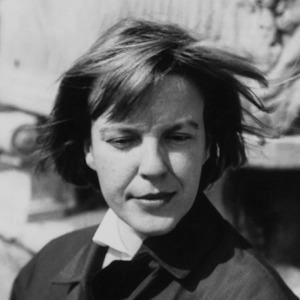Continuing the observance of National Poetry Month, I want to shift from the tiresome controversy around Günter Grass and his bad poem to celebrate one of the truly great postwar poets. In 1955 Henry Kissinger, then a professor at Harvard, invited a group of talented young Europeans to participate in a summer seminar. This would be Ingeborg Bachmann's only visit to America, and before traveling up to Cambridge she spent time at the Mansfield Hotel in Manhattan, just blocks away from the Mad Men of Madison Avenue, who were propelling the nation headlong into the advertising age. Bachmann's brief stay in Manhattan would bear fruit with her famous radio play Der gute Gott von Manhattan ("The Good God of Manhattan") and the beautiful poem Harlem.
In one of her last poems, Reklame ("Advertisement" – 1956), Bachmann brilliantly shows how the slogans of the Mad Men with their false promises of eternal happiness disrupt the poet's confrontation with her own mortality. The ever-louder Musik, reaching a crescendo with the neologism Traumwäscherei ("Dream-Laundry"), drowns out but cannot slow the inexorable movement towards the death-silence (Totenstille).
(English translation by Peter Filkens after the break).
Reklame
Wohin aber gehen wir
ohne sorge sei ohne sorge
wenn es dunkel und wenn es kalt wird
sei ohne sorge
aber
mit musik
was sollen wir tun
heiter und mit musik
und denken
heiter
angesichts eines Endes
mit musik
und wohin tragen wir
am besten
unsre Fragen und den Schauer aller Jahre
in die Traumwäscherei ohne sorge sei ohne sorge
was aber geschieht
am besten
wenn Totenstilleeintritt
-Ingeborg Bachmann
Advertisement
by Ingeborg Bachmann
But where are we going
carefree be carefree
when it grows dark and when it grows cold
be carefree
but
with music
what should we do
cheerful and with music
and think
cheerful
in facing the end
with music
and to where do we carry
best of all
our questions and dread of all the years
to the dream laundry carefree be carefree
but what happens
best of all
when dead silence
sets in
tranlated by Peter Filkins



0 comment
Great poem. Almost Celan-esque in the rhyme.
Good observation. But Bachmann wouldn’t resume her on-again, off-again affair with Celan until a year after Reklame was written.
Both Celan and Bachmann were very much influenced by Heidegger’s inventive use of German language.